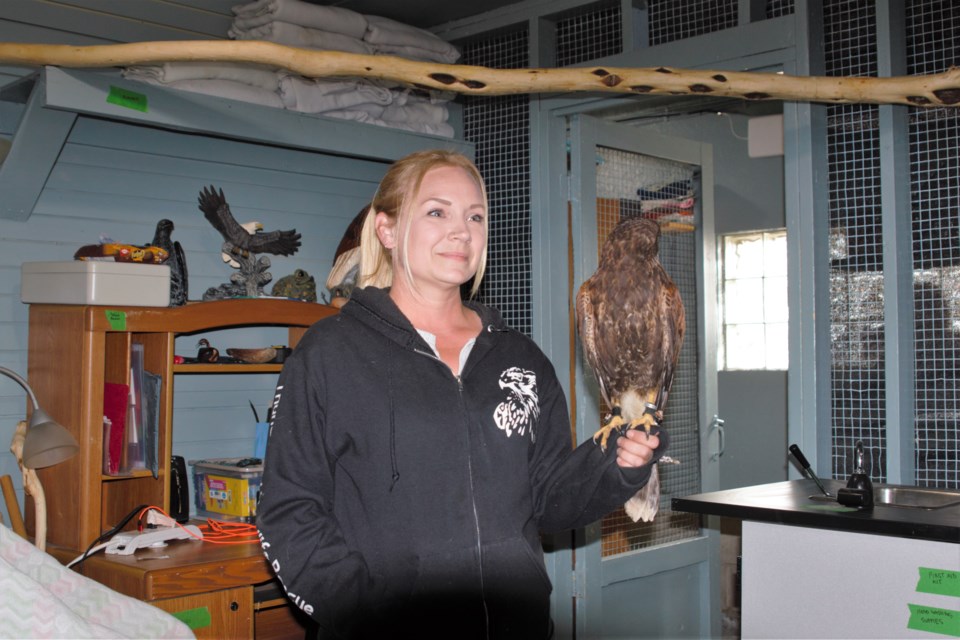THUNDER BAY — A wildlife rescue is looking for public support as it establishes a facility for the rehabilitation of animals at the former Chippewa Park zoo.
The Thunderbird Wildlife Rescue has made the appeal, launching a 50/50 draw and a call for volunteers, as it looks to refurbish a section of the zoo the city agreed to lease last year.
After getting the keys in November, Salo and other volunteers with the group have been working to prepare it to host wildlife, a task she described as daunting, but hopes to accomplish this year.
The group’s short-term plans include building a number of species-specific enclosures in the zoo’s former deer pen, revamping the two adjacent flight pens, and renovating the former “bird motel” for use as an office and for additional enclosures, the last of which Salo said is largely complete.
The group can’t welcome wildlife to the site until enclosures are complete and have passed provincial inspection, but it is already keeping chickens at the site to provide food for the birds of prey when they arrive.
The chicken coop will also offer opportunities for volunteers to learn about bird health, proper care, and bio-security measures, Salo said.
In the long run, she envisions rehabilitating aquatic birds and mammals in enclosures over a pond and creek near the flight pens, and helping other animals like foxes, deer, beavers, and herons.
Salo, a certified wildlife custodian, described the former zoo as an incredible springboard for realizing that vision.
“My dream has always been to open up a wildlife rescue here,” she said. “When this place closed, I started formulating the idea that, hey maybe this place wasn’t the best as a zoo, but it could be great as a wildlife rehabilitation centre. It has so much space already available, and it was created for specific, iconic species already that we work with.”
The venue also presents its share of challenges. It sat unoccupied for several years and is in need of significant rehabilitation itself, the group said.
Still, Salo sees vast potential, saying the site could one day become the largest wildlife rehabilitation centre in Ontario.
To take its first major steps toward that goal, Thunderbird has called for volunteers to perform manual labour revamping the space and building new enclosures.
The group, which obtained charitable status last year, also launched a 50/50 draw, hoping to raise around $20,000 to fund those renovations, and purchase food and medicine for animals.
Tickets can be purchased at local businesses including Bay Village Coffee, Pet Valu locations, Deluxe Paint, and more. Full details will be available at the group’s Facebook page.
Thunderbird is hopeful the community will see the value in its work, which they say is in dire need in the region.
“There are no wildlife rescues in the northern part of Ontario, so anything that is hurt either gets taken in by the public or goes to one of our private rehabbers, and we have about four in Northern Ontario — that’s it, and they’ll only take on a limited number of animals,” said Salo.
She’s fielded calls for assistance from not just the Thunder Bay area, but from communities across Northwestern Ontario, sometimes making flights by plane or helicopter to rescue animals after public requests.
The most common call is for animals injured by vehicles, Salo said, though she responds to myriad other situations.
“I think it’s really important to grow a community of caring about our wildlife. The more people have known that I rescue animals, my phone rings off the hook, and there’s so much more than just I can deal with.”
Salo has built increased community support around her efforts, with Thunderbird establishing a board of directors that includes members with significant animal welfare experience.
One of those board members, Nikki Burns, said she was inspired to help after seeing Salo run her bird of prey rescue operation out of her backyard, an effort she called herculean but worthy of appropriate support.
She said the organization has been buoyed by tremendous community support, saying rescue and rehabilitation work has a special resonance in the region.
“We have an absolute passion in this part of Ontario for wildlife, and we also have a deep emotional response when wildlife gets hurt… For somebody like Jenn to come along who has the proper certification, who wants to actually help these wonderful creatures is amazing.”
Burns said the ultimate goal is to build an educational facility alongside the rescue, to involve the community in opportunities for learning and appropriate interaction with wildlife.
Jeremy Gardiner, who works in animal welfare with the province, is another new board member.
He had encountered Salo in the course of his work several times, saying she often steps in with life-saving help when no other opportunities exist.
“I’ve had to call Jenn a few times for assistance with raptors, her specialty,” he said. “When this opportunity came up, I said yeah, I want to volunteer to help her out, because I know it’s a huge task to do.”
“The biggest value is that there’s someone to call. The ministry only has so much funding, so a lot of these things you call them for, they’re not able to attend. There definitely is a need for this.”
Neither Salo nor Ravin Perrier, who has joined her as a partner and apprentice working toward her falconry license, are paid for the work.
“It’s payment enough when you rehabilitate an animal and then you get to release it and watch it go — it melts your heart,” said Perrier.



